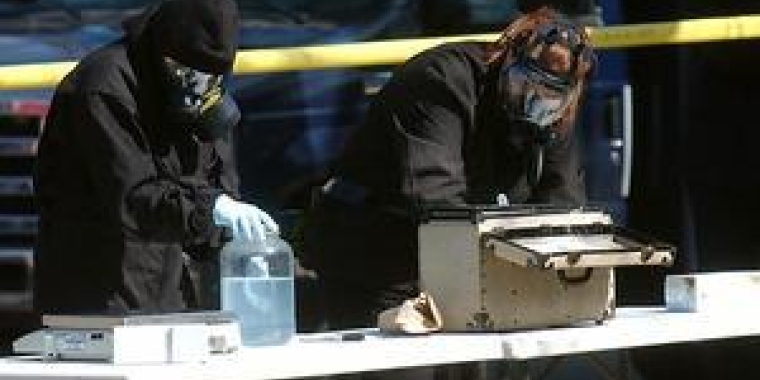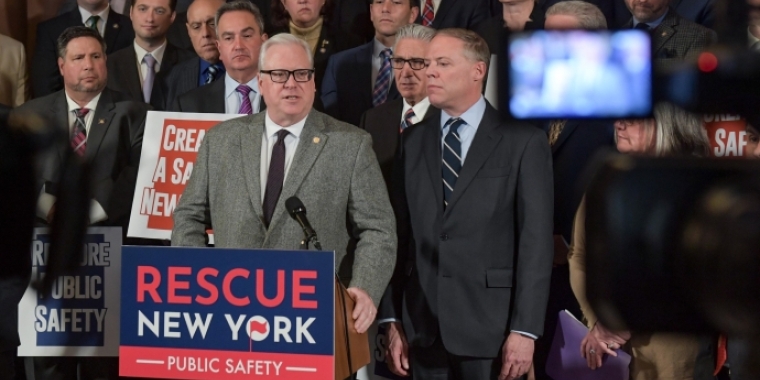
State Senate approves additional anti-meth legislation sponsored by O'Mara
Thomas F. O'Mara
June 11, 2014
-
ISSUE:
- Controlled Substances

Albany, N.Y., June 10—On the same day that the State Senate approved a comprehensive package of of anti-heroin legislation co-sponsored by Senator Tom O’Mara (R,C-Big Flats), the Senate also approved two pieces of anti-meth legislation that O’Mara has been pushing over the past few years.
"Meth and heroin are twin drug plagues that have been assailing lives and communities across the Southern Tier and Finger Lakes regions,” said O’Mara. “On the meth front, it seems like there’s a lab discovery or another meth-related incident somewhere in the region every week. These actions by the Senate would make it easier to prosecute meth crimes and impose tougher criminal penalties to punish meth convicts. It’s an important part of what must be a broader and ongoing effort to deter, prosecute and punish meth crimes, as well as raise public awareness of the danger. We hope tougher anti-meth laws will act as a stronger deterrent among our young people at risk of falling prey to this cycle of addiction and tragedy.”
Earlier this year the Senate approved legislation (S.3639) sponsored by O’Mara to further outlaw the operation of meth labs by increasing the criminal penalties for the possession of meth manufacturing material and the unlawful manufacture of meth, implementing a series of increasingly severe felony offenses. That legislation remains in the Assembly Codes Committee.
Today the Senate approved two additional pieces of anti-meth legislation.
One measure that O’Mara sponsors (S.3289/A.3528) would increase the criminal penalties for the possession and/or sale of methamphetamine to bring the penalties more in line with the penalties for possessing and/or selling cocaine and heroin.
The legislation is sponsored in the Assembly by Assemblyman Sean Ryan (D-Erie County) and is co-sponsored by local Assemblyman Phil Palmesano (R-C, Corning).
A second piece of meth-related legislation approved by the Senate (S.4652/A.1359), which O’Mara co-sponsors, would enhance the ability of local police and district attorneys to track and prosecute violations of restrictions on over-the-counter sales of cold medications that are key ingredients used in the manufacturing of methamphetamine.
If enacted into law, this second measure would, in state law, limit the sale of cold medicines containing pseudoephedrine to behind the counter, limit the amount of pseudoephedrine that an individual can purchase each month, and require that an individual present photo identification to purchase products containing pseudoephedrine.
A federal law enacted nine years ago, the Combat Methamphetamine Epidemic Act of 2005 (CMEA), already regulates retail over-the-counter sales of these products because of their use to manufacture meth. But while the CMEA has been helpful to law enforcement when investigating persons suspected of manufacturing meth, since no similar provisions exist directly in state law, local police and district attorneys are limited in their ability to fully pursue violations of purchase limits.
The NPLEx system is fully funded by the Consumer Healthcare Products Association (CHPA), a member-based organization of manufacturers and distributors of non-prescription, over-the-counter medicine and supplements. O’Mara noted that under the approved legislation retailers are only required to participate as long as the system is provided free of charge.
The legislation has bipartisan support in the Legislature. It’s sponsored in the Assembly by Assemblyman Steven Cymbrowitz (D-Brooklyn), who chairs the Assembly Committee on Alcoholism and Drug Abuse, and is currently in the Consumer Affairs and Protection Committee.
According to a 2009 report from the Rand Corporation, the economic cost of meth use in the United States reached nearly $24 billion in 2005 and could go as high as $48 billion.
Share this Article or Press Release
Newsroom
Go to Newsroom


